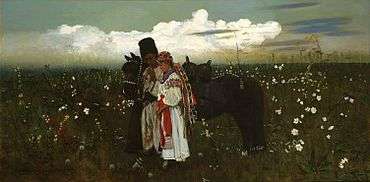Dumka (musical genre)

Dumka (Ukrainian: думка, dúmka, plural думки, dúmky) is a musical term introduced from the Ukrainian language, with cognates in other Slavic languages. The word "dumka" literally means "thought". Originally, it is the diminutive form of the Ukrainian term duma, pl. dumy, "a Slavic (specifically Ukrainian) epic ballad … generally thoughtful or melancholic in character".[1] Ukrainian and other Slavic classical composers drew on the harmonic patterns in the folk music of their countries to inform their more formal classical compositions. The composition of dumky became popular after the publication of an ethnological study and analysis and a number of illustrated lectures were made by the Ukrainian composer Mykola Lysenko in 1873 and 1874 in Kiev and Saint Petersburg. The lectures and publication were illustrated by a live performances by the blind kobzar Ostap Veresai who performed a number of dumky singing to the accompaniment of his bandura. Lysenko's study was the first to specifically study the melodies and the instrumental accompaniment played on the bandura, kobza or lira of the epic dumy.
A natural part of the process of transferring the traditional folk form to a formal classical milieu was the appropriation of the Dumka form by Slavic composers, most especially by Antonín Dvořák. Thus, in classical music, it came to mean "a type of instrumental music involving sudden changes from melancholy to exuberance".[1] Though generally characterized by a gently plodding, dreamy duple rhythm, many examples are in triple meter, including the popular Op. 72 No. 2 by Dvořák. Dvořák's last and best-known piano trio, No. 4 in E minor, Op. 90, has six movements, each of which is a Dumka; the piece is sometimes called the Dumky-Trio.[2]
Examples
Major examples in the classical repertoire include:
Antonín Dvořák
- Furiant with Dumka, Op. 12 (1884) for piano solo
- Dumka (Elegy), Op. 35 (1876) for piano solo
- Slavonic Dances, Op. 46 and 72, (Three of the sixteen)
- Violin Concerto in A minor, Op. 53, mvt. 3 - though based on a Furiant, the middle part is a Dumka
- String Sextet in A, Op. 48 (1878), mvt. 2: "Dumka: Poco allegretto"
- Piano Quintet No. 2 in A, Op. 81 (1887), mvt. 2: "Dumka: Andante con moto"
- Piano Trio No. 4 in E minor, Op. 90 (1891) — the Dumky-Trio
- String Quartet No. 10 in E-Flat Major, Op. 51 - B. 92: II. Dumka. Andante Con Moto
Leoš Janáček
- Dumka for violin & piano
Bohuslav Martinů[3]
- Dumka (unnumbered), H. 4 (1909 - Polička, Czechoslovakia), for solo piano
- Dumka No. 1, H. 249 (1936 - Paris, France), for solo piano
- Dumka No. 2, H. 250 (1936 - Paris, France), for solo piano
- Dumka No. 3, H. 285bis (1941 - Jamaica, NY, USA), for solo piano
Pyotr Tchaikovsky
- Dumka, Op. 59 (Scenes from a Russian village) for solo piano (1886)
Others
- Anatoly Kos-Anatolsky, Dumka and kolomiyka from the opera Sojchyne krylo
- Mily Balakirev, Dumka in E flat minor (1900)
- Vasyl Barvinsky, Dumka (1925)
- Alexander Borodin, Dumka (from the piano quintet nr.2 in A Major, op. 81)
- Frédéric Chopin, Dumka, Op. 74 No. 19, KK IVb/9, CT. 147
- Rebecca Clarke, Dumka, Duo Concertante for Violin and Viola, with Piano (1941)
- Franz Liszt, Dumka, S 249B
- Mykola Lysenko, 2nd piano rhapsody (1877)
- Moniuszko, Jontek's aria from the opera Halka
- Modest Mussorgsky, Paraska's aria from the opera Sorochynsky fair
- M. Shneider-Trnavsky, Dumka and dance for symphony orchestra (1909)
- M. Zawadsky, 12 dumky and 42 shumky
- V. Zaremba
- S. Zaremba
Notes
- 1 2 Randel: Harvard Concise Dictionary of Music, p. 148. Cambridge: Harvard University Press, 1978
- ↑ Antonin Dvorak
- ↑ Katalog skladeb Bohuslava Martinů
Sources
- S. I. Gritsa (Hrytsa) Dumi vidayushcheyesya dostoyaniye ukrainskoy kulturi (Dumy a remarkable product of Ukrainian culture) Musica anticqua Europae orientalis II Bydgosz, 1969.(In Russian)
- M. Antonowych Dumka and Duma in MGG